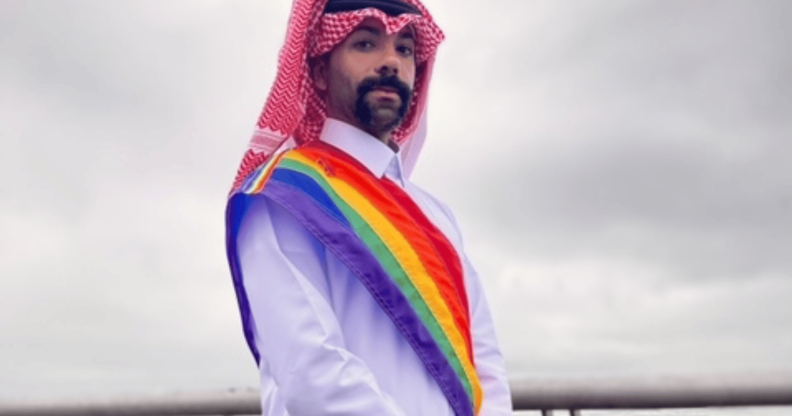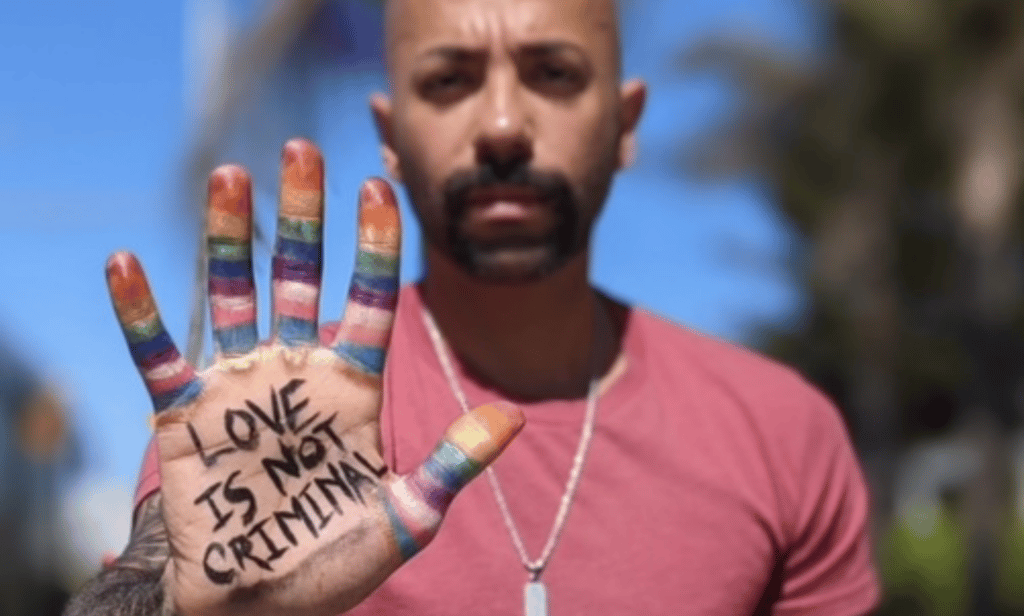Gay Qatari man won’t let World Cup ‘bury’ LGBTQ+ atrocities ‘in the shadows’

Dr Nas Mohamed says there is a “clear lack of transparency and visibility to the true extent” of the persecution of LGBTQ+ people in Qatar. (Dr Nas Mohamed)
A gay Qatari man who helped shine a light on the persecution of LGBTQ+ people in the Gulf nation is determined that the World Cup won’t succeed in “sports washing”.
Dr Nas Mohamed made headlines in May when he became the first known Qatari to come out on a public platform.
Homosexuality is illegal in the Gulf state. Same-sex relationships are criminalised and carry a punishment of several years in jail or fines. In some cases, under Qatar’s Sharia law, queer people can face death for living as their authentic self.
Since then, Mohamed (who currently lives in San Francisco, California) has used his platform to speak out against the criminalisation of queer people in Qatar and calls on celebrities to champion LGBTQ+ rights ahead of the World Cup, which begins on 20 November.
He’s also worked with Human Rights Watch (HRW), helping them to compile a damning report on how Qatar has arrested, abused and harassed LGBTQ+ people as recently as September 2022. HRW documented beatings and sexual assault by police, and heard from trans women who said they were ordered to attend conversion therapy by officials.
Mohamed says there is “clear lack of transparency and visibility to the true extent” of anti-LGBTQ+ persecution in Qatar.
“I think there’s some real opportunity here to bring visibility and extend help to people like us,” he says. “This event [the World Cup] was going to really bury us this year in the shadows and that was going to be really dangerous.
“I feel like we’re going to be at least seen and that we are going to have a platform with our own voice, with actual evidence-based reporting so that there isn’t this massive confusion that we’re seeing everywhere right now about what’s going on. We just need an accurate voice.”
Mohamed is working on getting the first LGBTQ+ non-profit organisation for the Gulf region “up and running”, to “get help and resources to continue to do the type of work” he did with the HRW, which isn’t easy.
“There are obstacles that exist that prevent us from being able to present accurate and reflective country condition reports on the LGBT community in Qatar,” he explains.
“There are some serious security concerns, and there are all of these societal obstacles for people to come forward and speak.”
View this post on Instagram
On 25 October, the veteran human rights activist Peter Tatchell held a one-man protest in Qatar against the nation’s human rights abuses. He was swiftly told to leave the country.
The protest triggered discourse online; while many praised Tatchell for raising awareness, others were concerned he was endangering queer people living under an oppressive regime.
Nas Mohamed says Tatchell’s protest was “disappointing” because it “shifted the media attention to him” just one day after the HRW report came out.
“It was a complete white saviour moment,” he says. “It was disappointing because Peter and I have been in touch even before I came out, and it’s disappointing to me that he thought he knew better.”
He continues: “He showed up for an hour and left Qatar. Let me tell you the consequences of that hour.
“He shifted the media attention to him in the same week I got a critical report on country conditions for LGBT people. He took the attention away from us and our persecution that week.”
Mohamed says he got reports two days later that surveillance in Qatar had been tightened as a result of Tatchell’s protest, and he had to “cut contact with a few people” to ensure their safety.
“How is you [Peter Tatchell] walking in, holding that sign in an authoritative regime government going to result in change? Let’s talk through it,” Mohamed says. “It’s so illogical. I’m willing to discuss his approach, but it was truly a very bad move.”

Dr Nas Mohamed says that he’s getting the first LGBTQ+ non-profit organisation for the Gulf region “up and running”. (Dr Nas Mohamed)
Tatchell tells PinkNews he respects Mohamed, but he says he was “urged” to do the protest by “LGBT+ Qataris and Qatari human rights defenders” that he’s “been in touch with for many years”.
The campaigner says these individuals asked him to “get maximum media coverage about Qatar’s human rights abuses”, which is “what [his] protest helped achieve”.
“If people think I was wrong, what would they do instead that would have a similar global reach and impact?” Tatchell says. “When I asked people in Nas’s group, no one had an answer.”
Tatchell adds his protest “generated renewed interest” in the HRW report, and that he “amplified it by mentioning it in many of [his] interviews”.
“Public spats and infighting do not advance the LGBT+ cause in Qatar,” Tatchell says. “There are many different ways to promote LGBT+ rights in Qatar. All are valid and contribute to LGBT+ progress in Qatar.”
Sport icons have highlighted the lack of LGBTQ+ rights in Qatar ahead of the World Cup kick off on 20 November
Mohamed says there is a lot of “reputation monitoring” and “sports washing” to try to cover up Qatar’s human rights record ahead of the World Cup, which begins on 20 November.
“What’s going on is that they’re bringing power – like people with big platforms – to project an image that is quite different from the reality that we live in Qatar,” Nas Mohamed explains.
David Beckham, a self-described ‘gay icon’, has faced criticism for his sponsorship deal with Qatar. He promoted Qatar as a “perfect” tourist destination despite its huan rights record.
Mohamed lambasted Beckham for “stamping out hope” for the LGBTQ+ community in Qatar in an open letter published in October. He said the English former professional footballer was ‘taking money and looking the other way’ with his promotional work for the 2022 World Cup.
While Beckham has remained silent, others in the sporting world have used their platforms to speak up for LGBTQ+ Qataris.
Australia’s national football team has denounced the “suffering” of migrant workers who helped to make the World Cup possible and the inability of queer people in Qatar to “love the person that they choose”.
Josh Cavallo, the gay Australian footballer, said in 2021 that he would be “scared” to play in Qatar due to its criminalisation of LGBTQ+ identities. In October, he vowed to “stand up for the LGBTQ+ athlete and fans at the World Cup in Qatar who can’t live openly or authentically”.

